Article's Content
Welcome to Volume 48!
It’s a short week for us, but that doesn’t mean this newsletter isn’t packed with some great info!
In this edition, we wanted to take a look at some topics that you likely have heard a lot about lately but didn’t have the full story.
For example, almost everyone has noticed empty store shelves and car lots over the past year. But do you know what is really causing these shortages? It’s a lot more complicated than you might think.
NFTs are another hot topic that everyone seems to be talking about. And it doesn’t seem like they are going away anytime soon. Especially after Visa bought an NFT a few weeks ago, setting up a blueprint for brands to buy into them as well.
Before we get into that, here’s a peek at what’s to come:
• Google Is Likely Under Investigation, Again
• Visa Buys & Legitimizes NFTs
• Chip Shortage Still Squeezing Major Industries
Google Is Likely Under Investigation, Again
Last week, it was announced that the US Department of Justice will likely be suing Google again before the end of 2021.
Unlike the first lawsuit, which wanted to bring all of Google to task over its monopolistic practices, this one is targeting Google Ads specifically.
Like the previous one, this new lawsuit could be brought against Google for monopolistic and antitrust violations.
The DOJ, following 11 other states, will likely claim in this new lawsuit that Google has consistently violated antitrust laws and conspired with Facebook to fix ad prices.
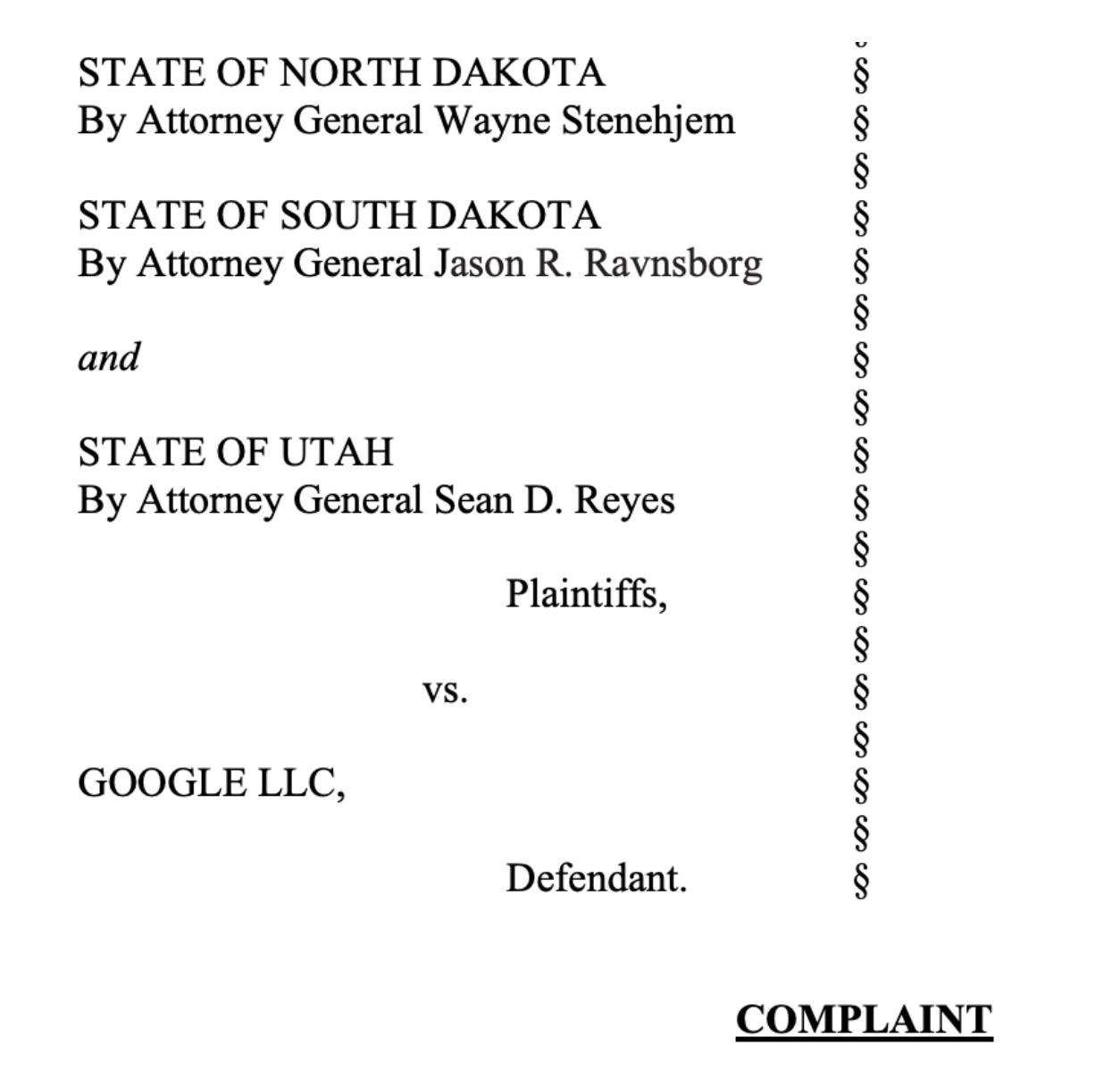
With Jonathan Kanter, a huge Google critic, running the antitrust division, everyone should expect this lawsuit to be extensive and brutal.
So what does this mean for marketers?
Nothing yet. These lawsuits will take years to work through the courts and will be appealed to the last day.
However, as more information comes out about how Google Ads works, this should help marketers in the long run.
Google Ads should get a lot more transparent on how they determine ad bidding, placement, and more. They also might be publicly shamed into changing some of their practices, like Facebook after the election interference stories started dropping.
Again, this is all good news for marketers. The more information we have, the better we can position our content and create more effective ads.
Even if the DOJ forces Google to spin off Google Ads, this should be seen as a win for both marketers and the general public.
Google might even use Google Ads as a sacrificial lamb to get the DOJ to stop investigating the entire company. A la Facebook blaming Cambridge Analytica for the majority of election misinformation that spread on their platform.
Only time will tell.
Key Takeaways
- Google is likely going to be sued again for antitrust violations & monopolistic practices.
- The antitrust division is being run by a huge Google critic, Jonathan Kanter.
- This should be seen as a win for marketers, but won’t affect their daily lives for a while.
Visa Buys (& Legitimizes) NFTs
Non-Fungible Tokens or NFTs are having a moment this summer. And it looks like their massive growth will continue.
If you’re not familiar with NFTs, this article has a great breakdown for curious readers.
Trading volume on OpenSea, a popular NFT marketplace and facilitator, grew from around $325 million in July to $3 billion in August.
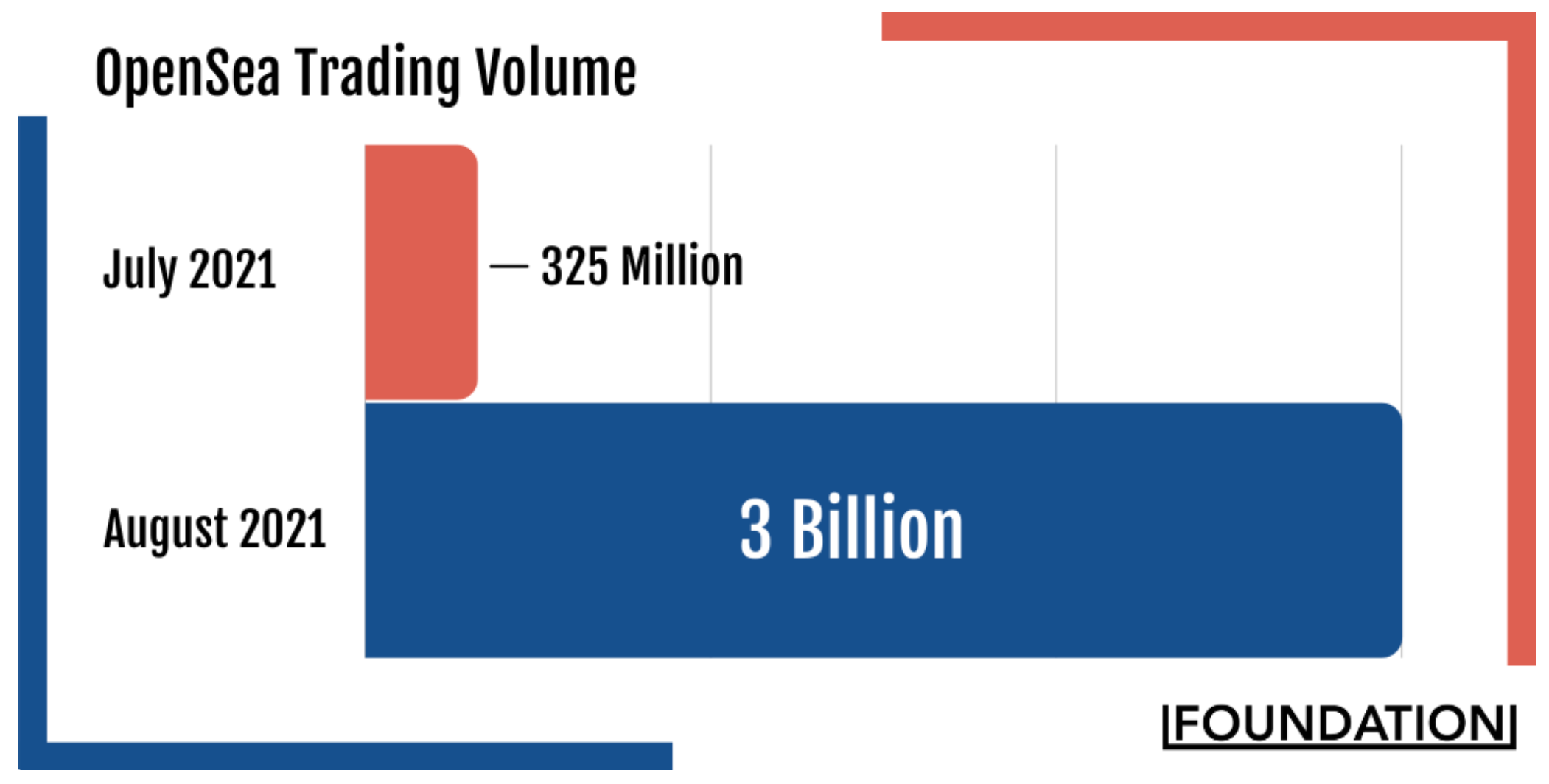
One day August actually saw $322 million worth of trading volume pass through OpenSea.
And a picture of the dog that inspired Dogecoin was recently valued at over $225 million.
Compare this to a total trading volume of around $100 million in all of 2020, and you can see, there’s a lot of money changing hands over the past few months.
Most of these brands like Bored Ape Yacht Club, or even OpenSea, might not be super familiar to the layman.
However, almost everyone in the world is probably familiar with Visa. They are seen as an institution on par with General Motors or Microsoft.
Recently Visa bought an NFT called CryptoPunk 7610 for $150,000 and plan to buy a lot more.

Partnering with Anchorage Digital they set up the entire process, and also created a map for future NFT transactions as well.
Visa says they believe that NFTs and crypto are the future, and they want to be a part of that future.
Starting with a widely recognizable NFT from the CryptoPunk collection was a smart move on their part as well. It will hopefully boost their credibility in both the eyes of people curious about NFTs and crypto enthusiasts.
Now we are pretty sure this was just a publicity stunt from Visa to tie themselves to crypto going forward. But it seemed to work. This announcement gained coverage in everything from Fobes, to CNBC and more!
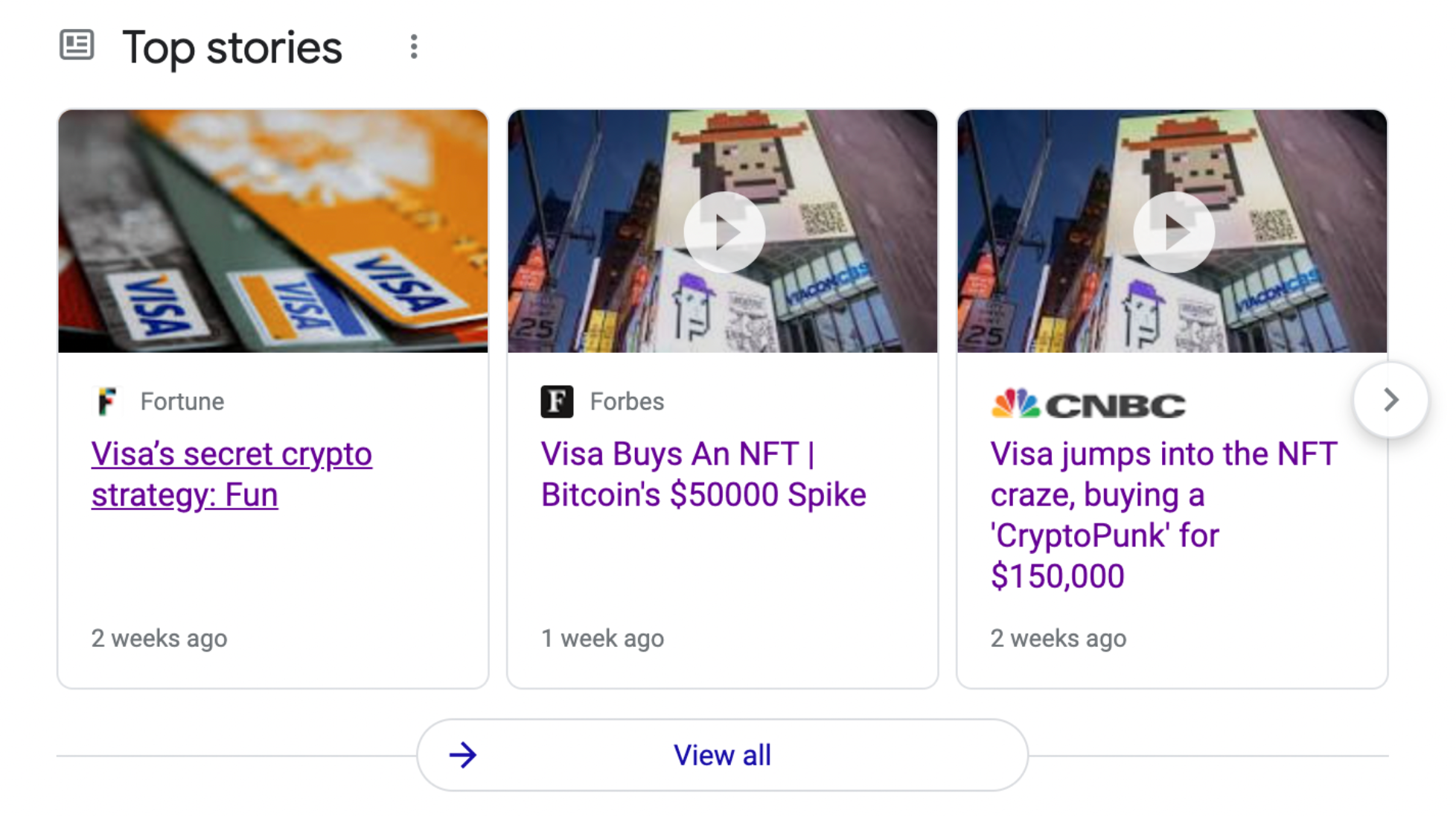
This stunt also likely legitimized NFTs to a lot of new buyers. I know I took a second look at them after hearing that such a huge company would be supporting NFTs.
If you want to learn more about NFTs, Visa also published a white paper full of helpful information.
Key Takeaways
- NFTs are blowing up and trading volume has exploded by 10x in one month.
- Visa bought a CryptoPunk NFT for $150,000 and plans to buy more.
- This move will likely boost their credibility in the crypto market and attract new buyers to NFTs.
Chip Shortage Still Squeezing Major Industries
If you’re wanting to purchase a new car soon, you might be waiting a while.
Compared to last year, dealers only have about ⅓ of the inventory on their lots. General Motors is shutting down its factories for a few weeks. And Ford saw a 33% decline in sales in August, which usually is a big month for automotive purchases!
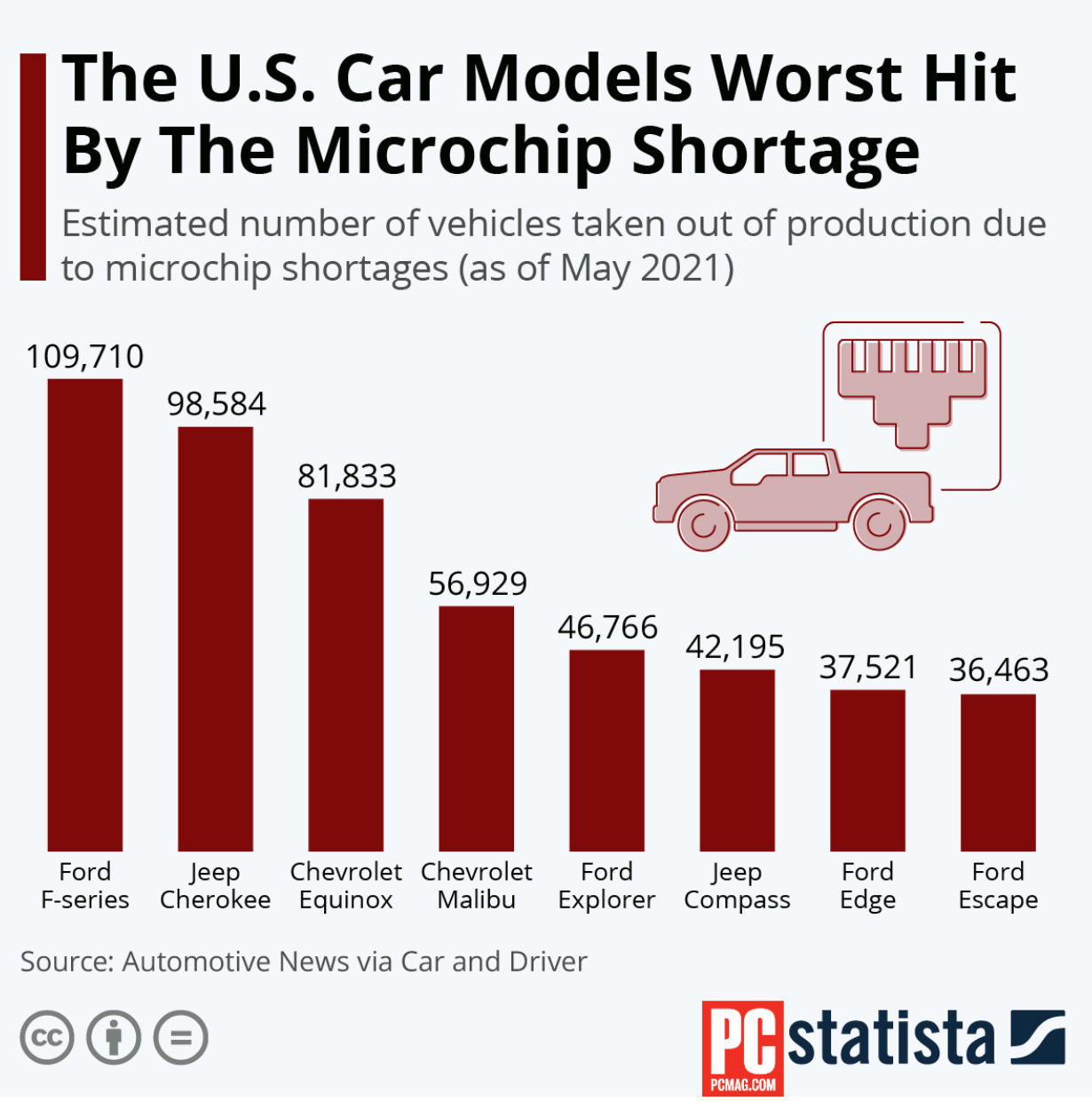
All of this is driven by one main thing: chip shortages.
And it’s impacting more than just the car industry, the auto shortages just happen to be the most visible right now.
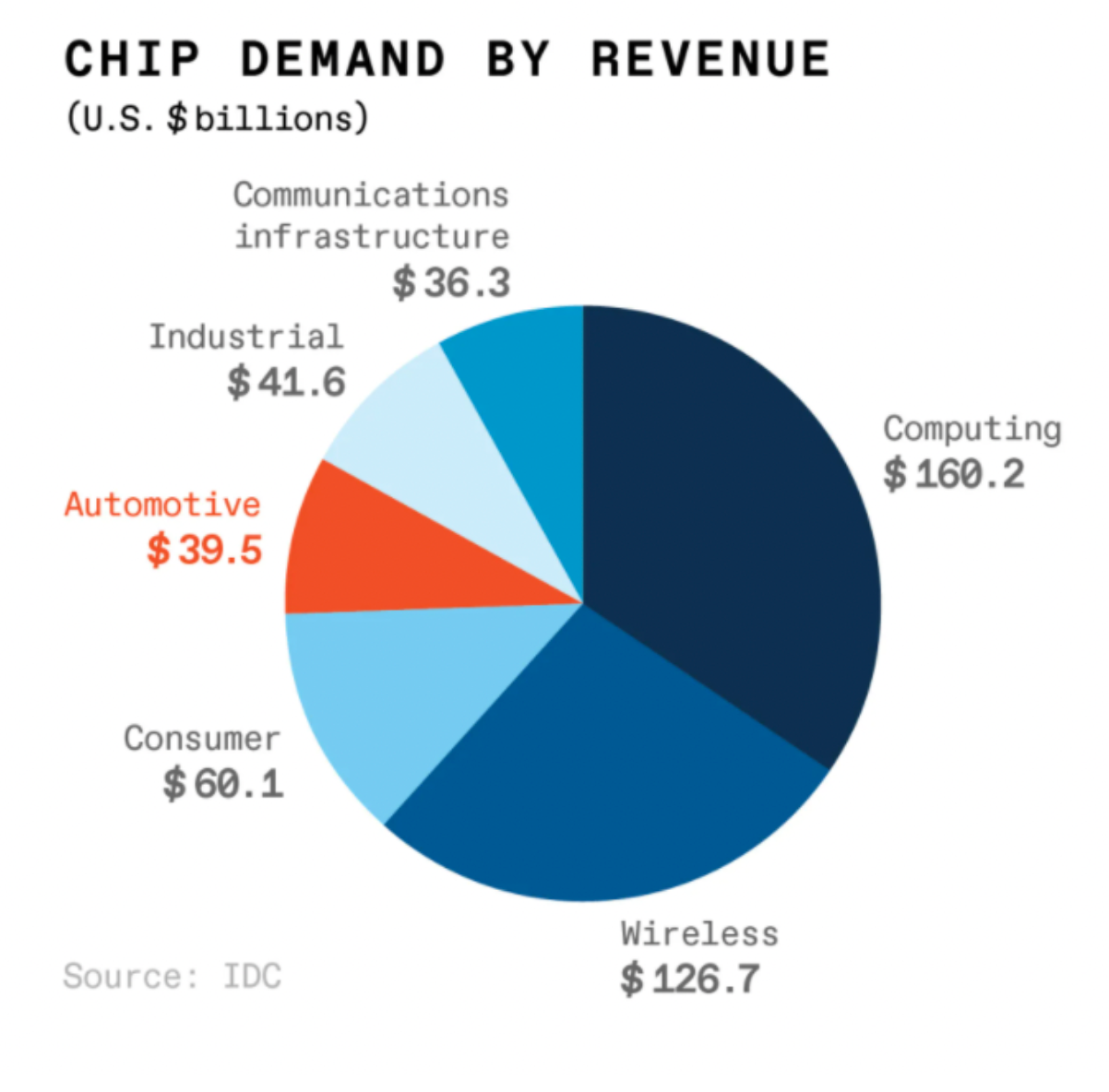
PS5s are basically impossible to find, even though they launched over a year ago.
Tesla is using any chips they can find and rewriting software to work with those older chips.
Apple is warning that chip shortages will impact its ability to launch the new iPhone and other products this year.
Some CEOs say that the shortage will last into 2023, with others hoping it ends before the end of 2021
As you can see, the chip shortage is impacting a ton of important industries. However, not many people know WHY these shortages are happening.
A very reasonable guess might be to blame worker shortages for these chip delays. But that’s just a small part of the problem.
Experts haven’t been able to point to one root cause of the shortage, but it boils down to a few key elements. Let’s break them down in no particular order.
First, at the very beginning of the pandemic, the main automakers cut both production and chip orders because of declining sales. These chip orders were mainly for older chips to power the many gadgets on every new car.
But during the lockdown, there was a MASSIVE increase in demand for consumer electronics like iPads, PS5s, graphic cards, and TVs. As well a spike in demand for Macbooks, monitors, and other business electronics.
As you probably could guess, the chips used in those devices were a lot more high-tech than those powering a backup camera or fuel gauge.
These high-tech chips were a lot more lucrative for factories to produce as well, which further cut the supply of the older chips.
So when the demand for cars spiked as people started to come out of lockdown, the auto manufacturers were not ready. They still haven’t caught back up, which is why automotive prices for used cars are continuing to spike. And will until 2023, according to experts.
Apparently, some brands are even doubling their chip orders, just to make sure they are never in that situation again. So that puts even more pressure on the supply chain and manufacturers.
This doesn’t even take into account the recent fires in top manufacturing plants, the lag time in production, or the upcoming sanctions on some Chinese brands.
As you can see, this chip shortage has exposed how fragile our world economy and supply chain really is.
Key Takeaways
- Chip shortage is affecting more than just the car industry, with Sony, Apple, Tesla, and more struggling with supply.
- Most experts say that this shortage is caused by a lot of different moving pieces outside of just worker and raw material shortages.
- Expect a low supply of consumer electronics, computers, smartphones, and cars well into 2023.
OTHER NEWS OF THE WEEK:
📊Tableau releases new big data features to help brands visualize & understand huge data sets.
🍎 Apple to start requiring users to turn on Personalized Ads before serving them ads in iOS15.
💰 Contentsquare, fresh off raising $500M, acquires HotJar for an undisclosed amount.
🐦 Twitter tests a new layout for iOS that expands images to span your whole screen.
BRAIN FOOD OF THE WEEK:
As more brands look to go public this year, they are starting to highlight their “mission” in official regulatory filings.
Instead of just listing how much money they made last year or their future profitability, brands are talking about how their products positively impact consumers and the environment.
This wonderful article from Corrie Driebusch outlines some of the brands taking this approach including Warby Parker, Chobini, and Rent The Runway.
In their filings to go public, Warby Parker outlined how their “Buy A Pair, Give A Pair” program has helped give glasses to those in need.
Allbirds even registered as a Public Benefit Corporation, which means it has duties to its shareholders and the social good.
In that article, they do note that most of the brands taking this approach are consumer-facing and looking to hire a lot of millennial talent.
So all of these could just be a new way of getting some positive PR.
But what do you think?
TWITTER THREAD OF THE WEEK:
How Does Coursera Drive ⅓ of Their Revenue From 3000 Accounts? From Ryan McCready
WHAT WE’RE WIRED INTO THIS WEEK 🎧:
If We Never Met by John K
Cali B is on vacation this week so these round-ups are brought to you by Ryan!
Stay up to date with all of our latest findings by subscribing to our newsletter today. Signing up also gives you early access to Ross’ Tuesday essay full of exclusive industry insights.
Quick, do it now before the next drop!








